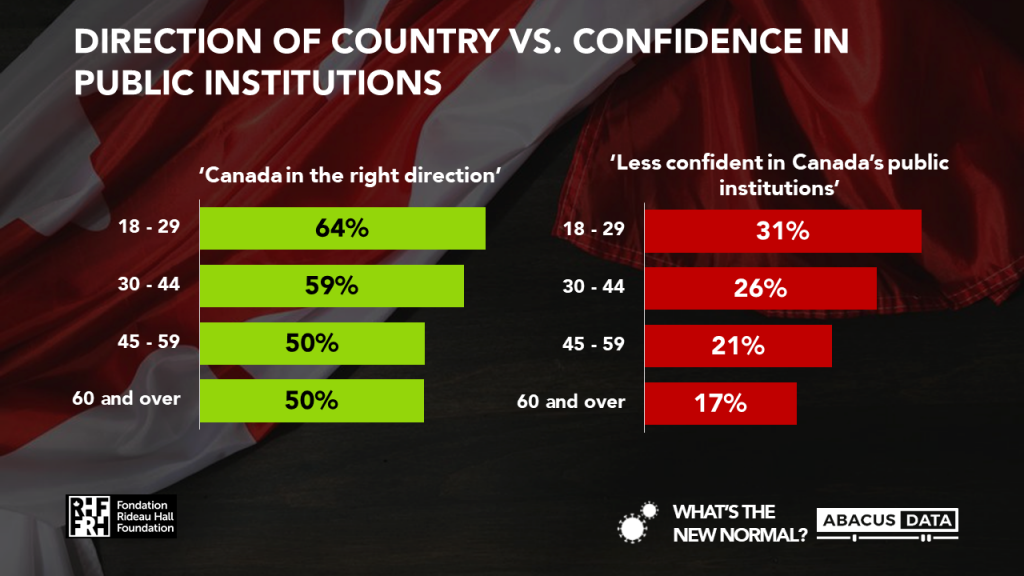Cet article est disponible en anglais uniquement.
By Oksana Kishchuk, Abacus Data
At the beginning of May, Abacus Data conducted a national public opinion survey commissioned by the Rideau Hall Foundation. This survey was a follow-up to research that was conducted in February just a few weeks before the COVID-19 outbreak and was intended to understand how the initial pandemic response has changed public impressions of Canadian public institutions.
Here is what we found:
For most Canadians, public institutions = government.
There are many public institutions in Canada, serving Canadians in many different ways, but when asked what comes to mind when they think “public institution” most said government.
We asked Canadians in an open-ended question what comes to mind when they think of the phrase public institutions. Top answers were:
- Something run by government/government offices (30%)
- Schools/education (23%)
- Hospital/Healthcare (17%)
This framing is important to understand when assessing the other findings. When Canadians are evaluating their public institutions, this is there frame of reference.
After canada’s initial response to the pandemic, perceptions of ‘canada’, especially among young canadians were more positive.
Since the pandemic started there has been a significant increase in the number of Canadians who say our country is headed in the right direction. In our survey:
- 55% of Canadians say the country is headed in the right direction, a 9-point increase from February.
- Among different age groups:
- 64% of those 18-29 say the country is headed in the right direction.
- 59% of those 30-44 say the country is headed in the right direction.
- And 50% of those over 45 say the country is headed in the right direction.
This shift is significant and may seem counter-intuitive given the disruption, anxiety, and economic harm the pandemic has caused. Yet despite the uncertainty, and these concerns, Canadians have become increasingly optimistic about our country and its foundation of public institutions that serve Canadians.

So why, despite all that’s happened, are Canadians more optimistic about the direction of the country?
A strong initial response to the pandemic.
One possible answer is performance of the public institutions that responded and served Canadians during the pandemic.
- 76% say Canada’s public institutions have responded very well/well/as well as can be expected to the COVID-19 pandemic so far.
- 36% say they are more confident in Canada’s institutions because of the pandemic. 41% are just as confident as they were before.
Another reason for the increased confidence is the prominence these institutions played in Canadians’ lives. For the past 14 weeks, these institutions, from our health system, to our political institutions, to our financial system were under duress. And for the most part, Canadians feel they not only responded well to this pressure but reassured them about their effectiveness and resiliency. For example:
- 74% say they are paying more attention to the healthcare system while 58% are paying more attention to news organizations as a result of the pandemic.
- Half (53%) say they are paying more attention to their provincial legislatures, and 43% say the same about their municipal government.
- 42% of Canadians are watching the federal public service more closely, who reacted quickly to establish a number of emergency programs.

Despite being in the spotlight, which doesn’t always produce positive evaluations, most Canadians have a positive view of public institutions’ initial response to the pandemic. While some remain consistent in their impression, one third of Canadians say the response to the pandemic has left them more confident about Canada’s institutions. And three quarters of Canadians think our institutions responded well. Only 14% say the response from Canada’s institutions has been poor.
Our survey also finds that more Canadians are associating positive attributes with our public institutions. 79% say our institutions are relevant (an increase of 7-points since February), 69% believe they unite Canadians (an increase of 10-points since February), and 75% describe them as accessible (up 6-points since February).

Having positive impressions of the country overall means having positive impressions of our public institutions.
Canadians who feel the country is headed in the right direction are even more optimistic and confident in Canada’s public institutions.
When we look at only those who said the country is headed in the right direction, these Canadians are more satisfied with our institutions response to the COVID-19 pandemic and more confident in our institutions as a result.

The pandemic has created an opportunity for Canadians to interact with, and reflect on institutions in a way they may never have done before. And as a result, the pandemic has allowed us to recognize the importance of having strong institutions, built on solid foundations that are able to respond to crisis or just keep our country running smoothly.
THE PANDEMIC HAS ‘RE-ENGAGED’ MORE CANADIANS.
Aside from more positive impressions of Canada and our institutions, and increased interest in certain institutions, overall public engagement has increased significantly. One measure we often track is ‘engaged Canadians’, or those who are paying attention to news, politics and current events. Between the end of February and the beginning of April the number of ‘engaged Canadians’ increased a substantial 27 percentage points.
While this level of engagement may not persist, the pandemic has clearly forced Canadians to become more engaged in their country, follow current affairs, and closely monitor what is happening around them. This may be a positive legacy of the pandemic.
ENGAGEMENT IS STILL LOWEST AMONG YOUNG CANADIANS.
Although engagement has increased at least 25 percentage points for each age group, younger Canadians continue to be the least engaged, even during the pandemic. Those aged 18 to 29 are 30-points less likely to be engaged than those aged 60 and over.

The COVID-19 pandemic has brought challenges for Canadians of all ages, though the impacts on young Canadians seem to be particularly tough. The unemployment rate is bleakest for this age group, and among students, summer job prospects have been severely affected. Given these impacts, it is noteworthy, and disheartening, that young Canadians continue to be the least engaged.
Also, while young Canadians have the most positive impressions of our country overall, they are also the least confident in Canada’s public institutions as a result of the pandemic.

This suggests younger Canadians are not making the connection between the ‘Canada’ they see and the public institutions that make Canada what it is.
WHERE TO FROM HERE?
Lots has happened since the beginning of the pandemic. The institutions involved in the COVID-19 response are shifting towards recovery, and other institutions, entirely separate from COVID-19, are now part of our news cycle. There is a lot to take in, and while Canadians are paying attention now it is time to engage to ensure that our public institutions are even more accessible and reflective of the population.
TIME TO ACT ON ENGAGEMENT, ESPECIALLY FOR YOUNG CANADIANS.
One way to ensure our Canadian public institutions stay relevant, and serve Canadians is to engage with them. Engaging with and participating within our public institutions can help to ensure the public institutions are looking out for our interests. Engagement also allows us to hold our public institutions accountable and ensure that they are continually serving the needs of all Canadians.
This is especially true for young Canadians. Young Canadians seem to feel the most pride for our country, but they are least likely to make the connection between the Canada they see, and the institutions that are our foundation.
Becoming more engaged with our institutions is a great way to learn more about how they work together and serve Canadians. Engaging with institutions means being part of the ‘Canada’ we are proud of, or sparking change within these institutions so they can become the foundation of Canada we want them to be.
METHODOLOGY
The survey was conducted online with 1,500 Canadian adults, from May 4 to 6, 2020. A random sample of panelists were invited to complete the survey from a set of partner panels based on the Lucid exchange platform. These partners are typically double opt-in survey panels, blended to manage out potential skews in the data from a single source.
The margin of error for a comparable probability-based random sample of the same size is +/- 2.5%, 19 times out of 20.
The data were weighted according to census data to ensure that the sample matched Canada’s population according to age, gender, educational attainment, and region. Totals may not add up to 100 due to rounding.


